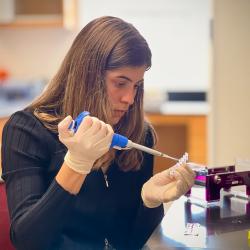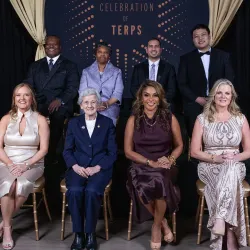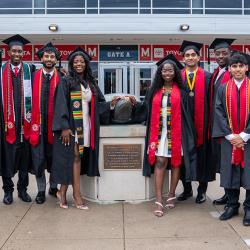Five Biological Sciences Majors Receive University Medal Honors
They interned across campus, around the country and on the other side of the globe. They founded nonprofits, volunteered at hospitals and schools, conducted groundbreaking research, and even played violin in the university’s Gamer Symphony Orchestra.
These are the six Terps considered for the University Medal, the highest honor given to an undergraduate by UMD, awarded at each spring commencement to the graduate or graduates who best personify academic distinction, extraordinary character and extracurricular contributions to the university and the larger community.
This year’s medalist is Sherry Fan, who is graduating with a 4.0 GPA and a dual degree in biological sciences and nutritional science.
Read on for more about her accomplishments as well as this year’s five finalists:
A published researcher, devoted volunteer to fighting hunger and poverty, and burgeoning artist in communicating complex science, Fan stood out even in a class of high-achieving Honors College students because of her intellect and enthusiasm.
“In my 42 years teaching at the UMD, I have never taught an undergraduate student with a stronger academic record,” said Todd J. Cooke, research professor in the Department of Cell Biology and Molecular Genetics and founding director of the Integrated Life Sciences Program in the Honors College.
The daughter of an immigrant from rural China, Fan grew up in Montgomery County, Md., hearing his stories about not having enough food or fresh water—a motivation to seek ways to help those in dire need. She became a National Merit Scholarship finalist and earned a Banneker/Key Scholarship at the University of Maryland, where she joined the Food Recovery Network to reduce campus food waste and served meals at homeless shelters in Washington, D.C., as a member of UMD Tzu Ching.
“I wanted to be able to give back to communities who were facing similar insecurities,” she said. “It was a personal issue to me.”
Fan worked for three years with Professor Wenxia Song on uncovering the cellular relationship between obesity, chronic inflammation and insulin resistance, and spent two summers interning at the University of Maryland School of Medicine, studying a cancer-promoting protein that could help with new treatments and analyzing potential genetic markers for aortic aneurysms. Fan will be a co-author on an upcoming paper in the peer-reviewed journal PLOS ONE.
Beyond the lab, she led service trips to Kentucky and made coloring books for patients at the Children’s Inn at the National institutes of Health—a talent that also landed one of her drawings with an article in Virology.
After graduation, Fan will pursue a dual M.D./Ph.D. at Cornell University and hopes to eventually work at an academic medical center to integrate service, research, art and teaching.
“I’ve grown a lot as a student but also as a human being during my time at UMD,” she said. “I was really able to step outside my own bubble.”
Elizabeth Childs
Elizabeth Childs has been fascinated by human-robot interaction (HRI) since she was a kid watching Pokemon on TV.
She spent her time at UMD advancing complex research in that area while participating in the Honors College’s Entrepreneurship and Innovation program and majoring in mechanical engineering as a Banneker/Key Scholar, with a 3.98 GPA.
Among her work, Childs explored virtual reality applications in the Geometric Algorithms for Modeling, Motion, and Animation Lab, shortened 3D-printing post-production time in the Bioinspired Advanced Manufacturing Lab and studied modular robotics for explosive ordinance disposal in Cambodia. Her first-author, peer-reviewed paper on 3D printing processes was published in the IEEE Journal of Microelectromechanical Systems.
Meanwhile, Childs was a teaching fellow in a thermodynamics course for five semesters, participated in the Quality Enhancement Systems and Teams (QUEST) honors program, competed in TerpTank with a business model to provide affordable meals to college students, and taught ACT/SAT prep in Chicago through the Alternative Breaks Program.
She was awarded a Knight-Hennessy Scholarship to Stanford University, where she will pursue a doctorate studying HRI, augmented reality and haptics (technologies stimulating touch and motion).
“I am so excited to see what the future holds for Elizabeth,” said Catherine Hamel, Keystone Instructor in engineering who teaches the thermodynamics course. “I know that she will be on the forefront of developing technologies that will better our society.”
Jackson Devadas
Biological sciences major Jackson Devadas spent his four years at Maryland examining how social contexts play a role in health, particularly the mental well-being of LGBTQ students and students of color.
A President’s Scholar and member of the Honors College’s Design, Cultures and Creativity program, he minored in statistics and conducted multiple research projects in the Sexual Orientation and Gender Identity lab, leading to a role in several published papers.
“He is driven by a desire for equity and justice, eager to learn and expand his areas of expertise, and thrives in a community-based, interdisciplinary learning environment,” said American studies Professor Jason Farman, director of the Design, Cultures and Creativity program.
Devadas was student director of the Ed Snider Center for Enterprise and Markets and held leadership positions with the LGBTQ+ Students and Allies in Public Health, the Pride Alliance, the Honors College Student Advisory Board and as Honors Ambassador.
He hopes to pursue a master’s degree in public health and doctorate in sociomedical sciences, focusing on mental illness within vulnerable communities, with the goal of becoming an educator.
Meron Haile
Looking back to her family’s move from Ethiopia to the U.S. in 2007, Meron Haile most remembers her parents’ focus on education as the key to independence.
She took that to heart, winning a Banneker/Key scholarship to Maryland, where she participated in the Honors College’s Integrated Life Sciences program, majored in biological sciences on the pre-med track, minored in global poverty and earned a 4.0 GPA.
Haile conducted research in a campus lab on oxycodone addiction, held internships at the National Institutes of Health and the Walter Reed Army Institute of Research, and served as a medical assistant at local hospitals and medical practices.
On campus, she’s been active in organizations that support immigrant and other underserved groups, including the Global Poverty Student Advisory Board, United Against Inequities in Disease (USAID), Terps for Change and CASA-Mi Esposito, where she helped immigrant youths learn English and tutored in other classes. She’s also been a teaching assistant for three years.
Marcia Shofner, senior lecturer in the Department of Entomology who teaches the “Principles of Ecology & Evolution” course, called Haile one of the “most consistent, reliable and creative assistants” she’d ever worked with. “I will miss her after she graduates, but she will be an amazing physician to whom I would love to take my family.”
Kyeisha Laurence
Only a few weeks into her freshman year at UMD, Kyeisha Laurence saw Hurricane Irma ravage her native St. Maarten. With the support of her new community in the Honors College’s Gemstone program, she led a collection drive to send clothes and other supplies there.
That set the tone for Laurence’s time at Maryland, where she was a Banneker/Key Scholar and earned a 3.97 GPA while pursuing a biological sciences major and minor in French studies.
In Gemstone, she led a research team focused on finding a novel therapeutic agent to treat allergies. She also interned as a UM Scholar at the University of Maryland School of Medicine.
Laurence served as a member of the College of Computer, Mathematical, and Natural Sciences’ Diversity and Inclusion Advisory Council, president of the Charles R. Drew Pre-Health Society, a cabinet member for the Caribbean Student Association, and a supplemental instructor for the Academic Achievement Programs.
She plans to spend a year conducting clinical research at the National Institute of Health, then pursue M.D. and M.P.H. degrees for a career in improving health care for low-income and underrepresented minority communities.
“Maryland has enabled me to follow my passions by supporting and providing me with a community of people who uplift, motivate and push me to be my very best,” she said.
Veeraj Shah
As co-founder and CEO of ChatHealth, Veeraj Shah initially planned to promote health care services to Terps via a chatbot. Now he has ambitions to reduce preventable diseases globally.
He dived into the opportunities at Maryland, where he combined his work in the Integrated Life Sciences Honors College program with research in the School of Public Health (SPH). He took advantage of expertise and funding through the School of Public Policy and its Do Good Institute and he co-founded his first company, Vitalize App, with the support of the Robert H. Smith School of Business’ Dingman Center for Entrepreneurship.
Shah interned in the Office of the U.S. Surgeon General, was a fellow of the National Institutes of Health (NIH) and led UMD’s chapter of Public Health Beyond Borders, among many other experiences. He contributed to 10 academic publications.
Dushanka V. Kleinman, principal associate dean and professor in SPH and a former NIH administrator, called Shah “the most productive and universally outstanding undergraduate student I have encountered.”
He earned a 3.98 GPA and dual degrees in biological sciences along with health policy and technology, a major he developed. He also completed 10 master’s and doctoral courses in health services research and biostatistics.
As one of 24 recipients nationwide of the Gates-Cambridge Scholarship, he will head to Cambridge University to pursue a doctorate in public health and primary care, then a medical degree at Icahn School of Medicine at Mount Sinai.







